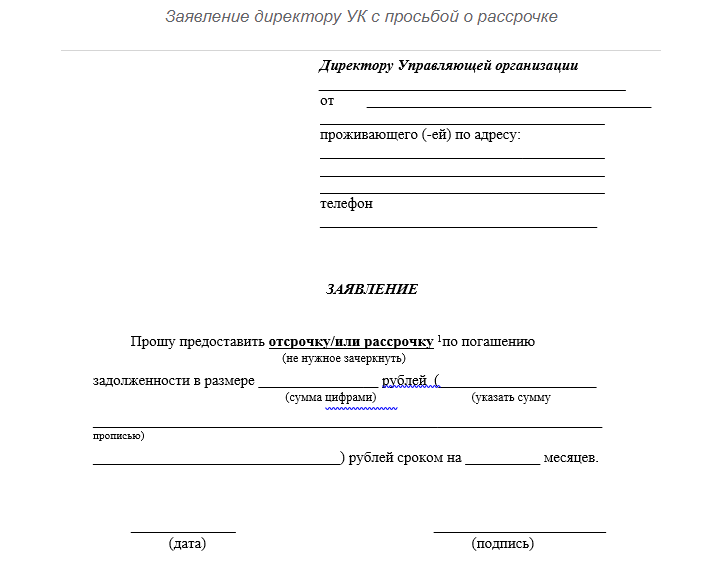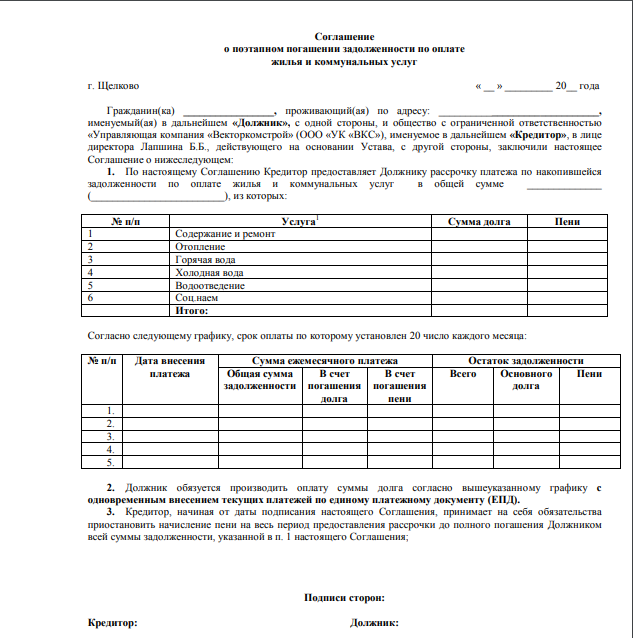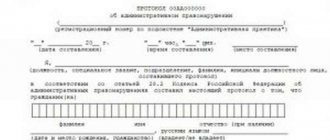What does debt for utilities lead to?
The main regulatory document regulating the legal relations between citizens and management companies is the Housing Code of the Russian Federation. An entire section (VII) is devoted to the issue of payment for residential premises and utilities, which states that the obligation to pay payment arises for the following categories of citizens:
- employers under a social tenancy agreement;
- tenants of state or municipal housing stock;
- members of a housing cooperative;
- home owners;
- developers or persons who accepted the premises under the transfer deed.
According to Art. 155, payment is due by the 10th day of the month following the billing month: for January - before February 10, for February - before March 10, and so on. It also provides that in case of late/incomplete payment for services, owners and tenants are required to pay the management company (MC) a penalty in the amount of 1/300 of the refinancing rate of the Central Bank of the Russian Federation for each day of delay, starting from 31 days. This leads to an increase in the amount of debt and even collection of it in court.
If there is a debt of 500,000 rubles or more, the company has the right to demand foreclosure on the debtor’s property: a car, an apartment, etc.
Restructuring of debt for electricity payments
On May 27, 2004, the Economic Court of Kiev considered in a court hearing the case on the claim of the Joint Stock Energy Supply Company (AEK) against the military unit (VCh) for the recovery of 69,438.05 UAH.
The plaintiff filed a lawsuit to recover from the defendant UAH 69,438.05 of the debt that arose in connection with the defendant’s failure to fulfill the terms of the debt restructuring agreement concluded under the agreement on the use of electrical energy, of which UAH 68,653.27 of the principal debt, 413, 12 UAH - inflation charges, 171.66 UAH - per annum, in addition, 694.38 UAH - costs for paying state fees and 118 UAH - for information and technical support for the trial.
In accordance with the requirements of Article 22 of the Economic Procedural Code of Ukraine, the plaintiff at the court hearing filed an application to increase the amount of the claim, in which he asks to recover UAH 93,691.38 from the defendant, including UAH 91,804.36 of the main debt under the debt restructuring agreement, 1422.97 UAH of inflation charges, 464.05 UAH per annum and, in addition, 936.91 UAH of state duty and 118 UAH of costs for information and technical support of the trial.
The defendant objects to the claims, as indicated in the response to the statement of claim. Namely: the actual debt of the defendant is less by UAH 67,293.38 than the amount indicated by the defendant. In addition, taking into account the statute of limitations, the debt restructuring agreement cannot be taken into account by the court.
Having examined the documents provided and heard explanations from representatives of the parties, the Economic Court of Kiev established the following.
On November 14, 1996, an agreement was concluded between the plaintiff and the defendant for the supply of electrical energy, under the terms of which the plaintiff undertook to supply electrical energy, and the defendant undertook to pay for the used electrical energy on a timely basis and in full on the terms stipulated by the agreement.
Clause 4.2. The agreement stipulates that in order to determine the amount of electricity used, the defendant undertakes to take and provide in the established form to the defendant the readings of the calculated electricity meters and electricity meters of sub-subscribers for each metering point separately according to the calendar schedule, as well as to keep records of electrical energy in a journal of the established form.
An addendum to the agreement, copies of which are attached to the case materials, defines a list of objects of the defendant’s structural unit to which electricity is supplied in accordance with the terms of the said agreement.
Fulfilling the terms of the contract, the plaintiff supplied the defendant with electricity, which is confirmed by reports for consumed electricity.
However, the defendant did not fulfill its obligations to pay for the received electricity properly in accordance with the terms of the contract, as a result of which the debt to the plaintiff as of January 1, 2004 amounted to UAH 160,657.64.
On January 28, 2004, an agreement was signed between the parties to restructure the debt under the contract for the supply of electrical energy, according to which the debtor (defendant in the case) recognizes and confirms the debt to the creditor (plaintiff in the case) under the contract for the supply of electrical energy in the amount of 160,657.64 UAH as of January 1, 2004 and undertakes to repay the specified amount of debt during February-August 2004 monthly before the 10th in equal parts, each in the amount of 22951.09 UAH.
According to Article 604 of the Civil Code of Ukraine, the obligation is terminated, in particular, by agreement of the parties to replace the original (primary) obligation with a new one between the same parties.
Thus, by concluding an agreement on debt restructuring, the parties agreed on the procedure for fulfilling the obligation to pay such a debt on the part of the defendant and the corresponding right of the plaintiff to demand payment of the debt according to the agreed schedule.
Clause 4 of the Agreement provides that when paying the debt, the debtor undertakes to refer to the specified agreement in the “purpose of payment” details of the payment document. In the absence of a clear formulation of the purpose of payment, the funds received by the creditor are counted primarily as payment for current energy consumption, and the remaining funds (if any) are counted towards the fulfillment of the Agreement.
According to Article 599 of the Civil Code of Ukraine (Article 216 of the Civil Code of the Ukrainian SSR), the obligation is terminated by duly fulfilled performance.
The defendant did not fulfill its obligations to pay the debt amount properly and on time in accordance with the debt restructuring agreement, as a result of which the debt to the plaintiff as of May 2004 amounted to UAH 91,804.36, which is confirmed by the case materials.
The defendant did not provide evidence of payment according to the terms of the contract.
The plaintiff claimed to recover 1,422.97 UAH of inflation charges, 464.05 UAH per annum as of May 27, 2004.
According to paragraph 10 of the Final and Transitional Provisions of the Civil Code of Ukraine, the rules established by the Civil Code of Ukraine on liability for violation of a contract apply in cases where the relevant violations were committed after the entry into force of the Civil Code, except in cases where in contracts concluded before January 1, 2004 years, other liability for such violations was established.
Thus, to resolve issues of the defendant’s liability for an offense arising from a debt restructuring agreement, the norms of the Civil Code of Ukraine should be applied, since these offenses arose after the entry into force of the Civil Code.
According to Part 1 of Article 625 of the Civil Code of Ukraine, the debtor is not exempt from liability due to the impossibility of fulfilling a monetary obligation.
Within the meaning of paragraph 5 of the debt restructuring agreement, in the event of a violation by the defendant of the terms and/or amounts of debt repayment, the debtor is liable in accordance with current legislation.
According to Part 2 of Article 625 of the Civil Code of Ukraine, a debtor who is late in fulfilling a monetary obligation, at the request of the creditor, is obliged to pay the amount of the debt, taking into account the established inflation index for the entire period of delay, as well as 3% per annum of the overdue amount, unless a different interest rate is established by law or agreement .
The Civil Code of Ukraine does not contain restrictions regarding the application of this type of liability to the debtor.
The calculation provided by the plaintiff of 3% per annum in the amount of 464.05 UAH and the inflation component of the debt in the amount of 1,422.97 UAH, taking into account the application for an increase in claims, meets the provisions of the legislation of Ukraine, therefore the claims in this part are subject to satisfaction.
Taking into account the above, the claims are justified, documented and subject to satisfaction in terms of recovery of 91,804.36 UAH of the principal debt, 1,422.97 UAH of inflation charges, 464.05 UAH per annum.
Based on the above and guided by articles 22, 49, 82-85 of the Economic Procedural Code of Ukraine, the Economic Court of Kyiv decided the following.
The claim is satisfied in full.
To recover from VC in favor of AEC the disputed amount from the defendant’s account, and in the absence of funds, from any other account identified by the state executor during the execution of the court decision. Issue an order.
To return to AEC from the State Budget of Ukraine 369.89 UAH of overpaid state duty.
(Decision of the Economic Court of Kyiv dated May 24, 2004. Case No. 35/168)
Share
What does debt restructuring mean for citizens?
The concept of restructuring is enshrined in Art. 105. It implies an agreement-based change of debt obligations to other terms and payment terms, as well as the possibility of their partial write-off.
This agreement establishes more acceptable terms for the payer, giving him the opportunity to pay off his bills in full with:
- reduction of monthly payments when the payment term increases;
- writing off part of the debt that arose for a good reason;
- providing temporary holidays on payment of bills with mandatory repayment of current accruals.
For management companies, it is important to regularly pay for the services consumed, which is stipulated in the concluded contracts. If payment deadlines are not met, a debt arises. It entails negative consequences not only for citizens, but also for the resource supplying organization, because a balanced budget and high-quality provision of services are possible only with proper payment of bills.
So, restructuring the utility debt is beneficial to both parties. The contract will allow the potential consumer to settle payments in stages, without accruing penalties, and the management company will save time and money on legal proceedings, working with bailiffs and collecting payments under enforcement documents.
The reasons for the debt and the amount may vary, but the most common are:
- dissatisfaction with the quality of services provided and the belief that tariffs are greatly inflated;
- deterioration in the financial situation of a family or a citizen living alone;
- personal reasons: illness, living in a remote area, etc.
In this regard, when establishing the terms for repayment of rent payments, an individual approach to each tenant is practiced: family composition, employment and average monthly income are taken into account. This allows you to choose an installment plan that will allow you to make current payments on time and repay the debt.
Benefits from debt restructuring
Debt restructuring benefits both parties. For utility workers, this is an opportunity to receive their money, albeit in parts, later than the deadline.
The consumer benefits are as follows:
- the amount does not have to be found in full immediately, since the money is paid gradually and in parts;
- the debtor eliminates the risk of accrual of penalties and penalties, since the utility company voluntarily provides a deferment;
- the owner of the property is protected by the terms of the contract signed by the parties.
We recommend: How to calculate fees for hot and cold water
By agreeing on a restructuring, the consumer has the opportunity to continue making current payments without further increasing the amount of debt.
The legislative framework
Since the collection of utility bills almost always occurs in an indisputable manner, home owners and tenants need to know what laws govern the calculation and procedure for paying utility bills.
Having studied the relevant regulatory documents, it is easy to figure out in which cases the conclusion of a restructuring agreement is beneficial to the payer, and in which it is not.
Since the contract is the main regulator in any area of relations, including housing, the main legal act regulating obligations and the procedure for their fulfillment is (Articles 420-453).
The issues of providing utility services and their payment are discussed in more detail in Section VII of the Housing Code of the Russian Federation.
The relationship between providers and consumers of utility services, the procedure for quality control and determining the amount of payment is regulated.
Controversial relations between consumers of utility services and management companies, as well as resource supplying organizations, are regulated. An example is the illegal shutdown of electricity or other housing and communal services.
Who can apply for debt restructuring
Revision of the terms of the contract for the provision of utility services or settlements is possible only under certain circumstances. The main reason is the financial situation, which does not allow timely payments for gas, water and heat supply. It is for this reason that most consumers are interested in whether it is possible to pay off the debt for light in installments.
The owner or tenant of an apartment has the right to initiate the conclusion of an installment agreement if the following circumstances arise:
- long-term illness or disability;
- loss of a breadwinner and lack of sources of income for other residents;
- job loss and long-term inability to find work;
- maternity leave or family problems;
- a large number of loans and the inability to pay them.
All circumstances require documentary confirmation. Evidence may include income certificates, work records, birth/death certificates, extracts from an outpatient card and other documents.

Conditions for restructuring housing and communal services debts
Although the payment schedule under the restructuring agreement is drawn up taking into account the capabilities of a particular debtor, management companies try to comply with the principle specified in Art. 138. According to this article, monthly deductions from wages should not exceed 20% of the amount remaining after taxes. Under these conditions, the consumer will be able to easily repay debt and pay current bills.
There are often cases when, when concluding an agreement to revise payments, the previously accrued penalty is written off:
- taking into account the proportionality of the principal debt and the penalty, established by Art. 333 Civil Code of the Russian Federation;
- when applying the limitation period, according to Art. 196 of the said act.
As a rule, when determining the conditions for debt restructuring, management companies take into account the following circumstances:
- the period of non-fulfillment of obligations;
- dishonesty of consumer actions;
- ratio of the amount of debt and penalty;
- the financial ability of the debtor to pay the amounts under the contract and current payments.
It is worth noting that restructuring the debt for housing and communal services for a dysfunctional family is impossible, because in an atmosphere of conflicts, parasitism, abuse of alcohol and drugs, or addiction to gambling, compliance with any agreements is doubtful.
In this case, the debt is collected in court. Consideration of claims for the collection of debts on utility bills up to 500,000 rubles takes place by order, without calling the parties, in accordance with Ch. eleven .
In this regard, before submitting an application for concluding an agreement, it is worth checking the information on the collection of the amount provided by the official website in the Russian Federation. If enforcement proceedings have not been initiated, you can contact the resource supply organization and apply for an installment plan.
Limitation periods for collecting debts for utilities
Chapter 12 of the Civil Code of the Russian Federation stipulates the concept of a limitation period, after which the amount of the debt cannot be recovered from the debtor. In accordance with the provisions of Art. 196 of the specified document, this period in general cases is three years. This also applies to utility bills.
But it is important for the payer to consider the following points:
- the calculation of the limitation period is based on the decision of the court - this is why utility companies are in no hurry to go to court with a demand for debt payment;
- if the debtor pays some part of the amount, recognizing the existence of the debt, the countdown resumes from the date of payment;
- Housing and communal services structures do not have the right to enter the amount of debt into current accounts.
The consumer must remember that the mere fact of expiration of the noted three-year period does not confirm exemption from debt obligations. This must be confirmed by the court based on the results of the filed claim.
The procedure for drawing up an agreement to revise the terms of debt payment
It is advisable to clarify all the details of how to properly restructure the housing and communal services debt with the management company or resource supplying organization. But in most cases, after considering the application and making a decision on installment payments, the tenant is offered to enter into an agreement containing a new payment schedule, installment period and payment method.

Documents for obtaining installments
The main document for making a decision on debt restructuring is a statement, to which should be attached:
- identification;
- certificate of family composition;
- a certificate of the amount of debt or readings of measuring instruments;
- document on official employment or work book confirming dismissal;
- family income certificate;
- in case of illness - a certificate of the need for treatment;
- confirmation of the right to reside in a residential premises: rental agreement, social lease or certificate of ownership.
Typically, all documents, except certificates of family composition, income and employment, are provided in the form of copies.
Application for concluding an installment agreement
There is no established application form for applying to the management company with a request for installment payment of the debt amount. But any written appeal must comply with the requirements of Art. 7 and contain the following data:
- name of company;
- Full name, address and telephone number of the applicant;
- reason for contacting and a brief description of the situation;
- proposal of terms and conditions for installment plans;
- signature and date of the application.

The specified documents are attached to the application, after which it remains to wait for the decision of the Criminal Code and the invitation to sign the contract.
Debt restructuring agreement
If both parties are satisfied with the terms of the installment plan, they sign an agreement that contains:
- details of the company and the debtor;
- detailed information about the occurrence of debt, amounts written off and planned repayment of the balance;
- new payment schedule;
- liability of the parties in case of violation of obligations under the contract;
- duration of the agreement.
The main obligation of the resource supplying organization is to provide utilities in full, and the tenant’s is to timely pay current payments.
The document is drawn up in two copies having equal legal force. One is received by the debtor, the other by the service provider. From the moment the contract is concluded, the debt is no longer such and the accrual of penalties for the specified amount ceases.

Rent debt restructuring agreement - sample and terms of execution
The law does not provide for a special form for concluding a deal on the gradual payment of money for utilities. But legal norms allow us to draw an analogy with legal relations that arose from another sphere of civil norms.
Thus, Law No. 83 Federal Law of July 2002 provides for the right of agricultural organizations to restructure debts on taxes and fees.
Regulatory acts of the regions allow the establishment of a procedure for the gradual repayment of budget loans by commercial companies. Banks use restructuring to return loans issued to citizens during a crisis.
Positive aspects of debt restructuring
The main advantage of concluding an installment agreement is the opportunity, even if there is debt, to apply for benefits or a subsidy to pay for housing and communal services. This rule is established in Art. 160 of the Housing Code of the Russian Federation and states that compensation for expenses for payment of residential premises and utilities is provided in the absence of debts or the conclusion and implementation of agreements for its repayment.
Other benefits of restructuring include:
- uninterrupted provision of energy supply, heat supply and other services;
- settlement of the dispute peacefully;
- the ability to minimize the amount of debt and write off penalties.
The agreement also has negative sides: confirmation of the amount of debt and the inability to challenge it, as well as an extension of the statute of limitations.








